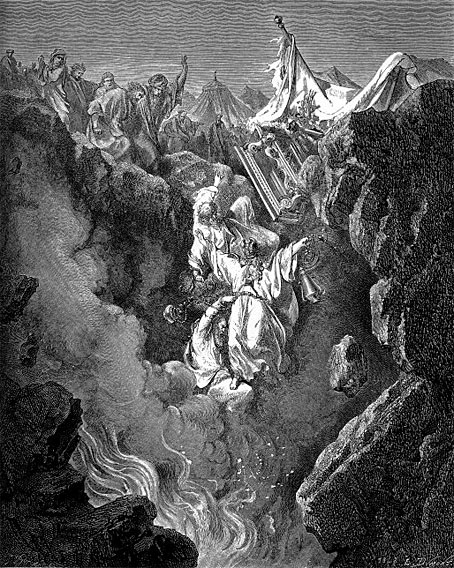The Falling Away
 “Let no one deceive you by any means; for that Day will not come unless the falling away comes first, and the man of sin is revealed, the son of perdition.” (2 Thessalonians 2:3)
“Let no one deceive you by any means; for that Day will not come unless the falling away comes first, and the man of sin is revealed, the son of perdition.” (2 Thessalonians 2:3)
Non-dispensationalists are often accused of “Replacement Theology,” that is, the church replaced Israel. But we find in the Old Testament many examples of the same process prefiguring what the people of God went through in the first century. It is not replacement, but transformation.
James Jordan writes:
When God called Israel out of Egypt, most of the people refused to follow Him and died in the wilderness. The old Hebrew people ceased to exist and were transformed into Israel, their new name. (I have discussed this succession of names in my book, Through New Eyes.)
The Israel that entered into the promised land was a new people made up of a mixture of Hebrews and converted gentiles, the mixed multitude. Their leaders were Joshua, a converted Hebrew, and Caleb, a converted gentile Kenizzite (Gen. 15:19; Josh. 14:6). (By “conversion” I mean that they entered the Mosaic Covenant.) According to Numbers 13:6, Caleb’s family had not only been adopted into the tribe of Judah, but had risen to prominence in it.
This event is directly analogous to the New Testament situation. The wilderness wanderings lasted 40 years, as did the span between A.D. 30 and 70. The Jews were called by Jesus and the apostles, and many converted (that is, they entered the New Covenant). Some reverted to Judaism, turning into apostate Judaisers, and like the apostates in Moses’ day, they “died in the wilderness by A.D. 70. Meanwhile, many “mixed multitudes” gentiles joined the kingdom. By A.D. 70, it was time to enter the promised land, and the old Jewish people ceased to exist, being transformed into Christians, their new name.
The same kind of event happened at the Exile. A study of the book of Ezekiel will show that God called His people out of Judea into the wilderness of exile, where He tabernacled with them. The people were given a choice: either move forward with God or perish by looking backward to the old ways. During the time of exile, as we have seen, many gentiles were converted into the nation. By the time the Exile was over, and the people returned to the Promised Land, the old Israel ceased to exist, being transformed into Jews, their new name.
Let us return to the Mosaic transition and examine the phenomenon of “falling away.” At Mount Sinai, all the people accepted the new Mosaic Covenant. Before too long, however, a large group of people were objecting to one of the most distinctive features of the Mosaic Covenant. During patriarchal times, any man might offer sacrifice at an altar to God, but the worship of the Tabernacle was “closer” to God and therefore holier and more dangerous. It is dangerous for a sinner to get too close to the Consuming Fire, and so the only people allowed to approach the new Mosaic altar were the priests, who were specially ordained and anointed for this purpose. God forbade all sacrifice except that conducted at the Tabernacle, which meant that the Hebrew people were no longer permitted to build and sacrifice at altars.
As it became clear that the people had “lost” this “right,” those who did not perceive that the Mosaic Covenant was in fact more glorious than the Abrahamic Covenant had been, rebelled. Their argument was that “all the people are holy and all are priests” (Ex. 19:6) and that Moses and Aaron were exalting themselves over the congregation (Numbers 16-17). They were drawing the wrong inferences from Exodus 19:6 because they were clinging to the older covenant.
This group of rebels is closely paralleled by the Judaisers of the New Testament era. The Judaisers were people who became Christians, and then realised that the leaders of the Christian community were changing the rules on them. Just as Korah, Dathan, and Abiram did not want to give up the old Hebrew ways in order to become Israelites, so the Judaisers did not want to give up the old Jewish ways in order to become Christians.
Just as Korah and company accused Moses and Aaron of inventing their own religion, so the Judaisers accused Paul. Just as many of the Israelites in Moses’ day wanted to return to Egypt, so the Judaisers wanted to return to Judaism. This is the “falling away” to which the New Testament refers a number of times.1
“Woe to them! For they have gone in the way of Cain, have run greedily in the error of Balaam for profit, and perished in the rebellion of Korah.” (Jude 1:11)
_________________________________
1 James B. Jordan, The Future of Israel Re-examined, here, in issues 13-15.
See also The Man of Sin.

























